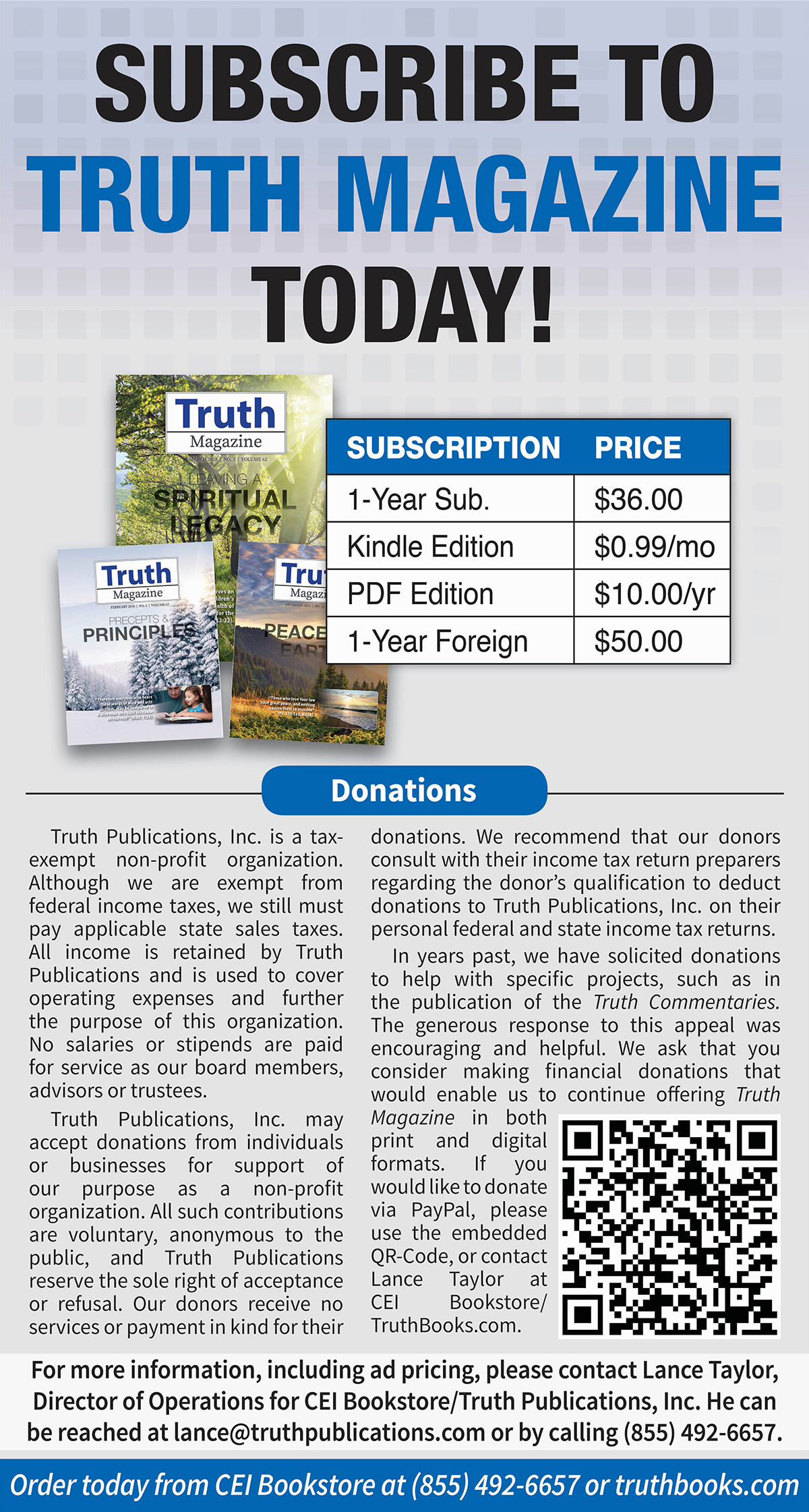

by Mark Mayberry
Synopsis: By saying, "Take heed how you hear!" and asking, "Have you not read?" Jesus necessarily infers that disciples must draw correct and crucial conclusions from the sacred text.
Jesus answered and said to him, "Truly, truly, I say to you, unless one is born again he cannot see the kingdom of God.... Truly, truly, I say to you, unless one is born of water and the Spirit he cannot enter into the kingdom of God" (John 3:3, 5).
Jesus concluded His discussion of the new birth with Nicodemus by saying, "Are you the teacher of Israel and do not understand these things?" (John 3:9-12). In other words, the Lord gently chided Nicodemus, a teacher in Israel, by asking, "Why are you having such a difficult time understanding these concepts? You should have known!"
Teachers bear a weighty responsibility (Jas. 3:1). They must steadfastly avoid hypocrisy (Rom. 2:17-23), fruitless discussion, speculation, and ignorant assertions (1 Tim. 1:3-7).
Faithful prophets frequently rebuked Israel's supposed spiritual leaders: "Those who guide you lead you astray and confuse the direction of your paths" (Isa. 3:12; cf. 9:16). Jesus denounced the scribes and Pharisees, who loved to be called "Rabbi," but were ineffective blind guides (Matt. 15:12-14; 23:1-12).
Christ concluded the parable of the lamp by saying, "So take care how you listen." In other words, He said, "Use your ability to reason. Make proper application."
When the disciples failed to help a demon-possessed child, Jesus sternly rebuked them, and dramatically demonstrated His power by casting out the evil spirit. Afterward, He said, "Let these words sink into your ears; for the Son of Man is going to be delivered into the hands of men." Yet, they did not understand the statement or perceive His meaning (Luke 9:37-45).
During His earthly ministry, and afterward, in revealing the Apocalyptic message of Patmos, the Lord repeatedly said, "He who has ears to hear, let him hear" (Matt. 11:15; cf. 13:9, 43; Rev. 3:6, 13, 22; 13:9; etc.).
Teachers and students share responsibility for the learning process. May we diligently seek God's approval, endeavoring to understand the word of truth, consistently live according to its precepts, and accurately communicate them to others (2 Tim. 2:15; Eph. 5:17; Col. 1:9-12).
In this lesson, let us consider certain truths that Nicodemus should have recognized, both as a student of God's word and as a teacher of the same. Ultimately, we must apply these principles to ourselves.
Jesus' encounter with Nicodemus is recorded in John 3:1-21. Nicodemus offers an accurate opening observation (vv. 1-2). Our Lord responds with an abrupt and unexpected statement (v. 3). Nicodemus objects by implying that Jesus' declaration is absurd (v. 4). Jesus patiently elaborates, expanding His original pronouncement and proving His point (vv. 5-6). Demonstrating obstinacy, Nicodemus asked, "How can these things be?" (v. 9). Reprimanding Nicodemus, Jesus replied, "Are you the teacher of Israel and do not understand these things?" (v. 10). Subsequently, the Lord offered a detailed explanation—rebuking Nicodemus' unbelief, appealing to his reasoning ability, recalling examples from Israel's past, making relevant application (vv. 10-15). Jesus concluded by contrasting divine mercy and judgment, and distinguishing between light and darkness, good and evil, obedience and rebellion (vv. 16-21).
For our present purposes, let us focus upon the opening salvos of this discussion. By declaring, "Rabbi, we know that You have come from God as a teacher; for no one can do these signs that You do unless God is with him" (v. 3), Nicodemus confessed a truth that he had not fully embraced. The signs that Jesus performed proved His provenance: He was, indeed, from God. Since that was the case, certain consequences and conclusions must necessarily follow.
In the ensuing discussion, Jesus made two inter-related and declarative statements (vv. 3, 5). Both connect with citizenship in God's kingdom. The latter expands upon the former: "born again" (v. 3) is inflated to being born of water and the Spirit (v. 5).
When Jesus said, "You must be born again," He was speaking symbolically. Just as circumcision has both a physical and spiritual meaning in the Old Testament (Deut. 10:12-16), so likewise, Nicodemus should have recognized that the birth process can be understood literally and figuratively (John 3:1-8; cf. 1 Pet. 1:22-23).
Nicodemus should have recalled Old Testament imagery of newness and renewal (Ezek. 36:22-27; cf. 2 Cor. 5:17).
Jesus was saying, "Your original statement was correct: I am from God. Therefore, Nicodemus, you need to look at things from a different perspective." Immediately, the Lord challenged his underlying assumptions.
False concepts and foolish ideas often achieve near-universal endorsement. Today, this is seen in the widespread acceptance of evolution, socialism, global warming, non-binary gender identity, etc. Similarly, first-century Judaism anticipated the establishment of a physical Messianic kingdom.
Kingdom citizenship is not achieved through military conquest but by personal conversion. It results in a spiritual alteration of individuals, not a political reordering of the world. It is not attained by fleshly but spiritual power. It is not visible but virtual. These changes are mostly unseen, like the wind, but are undeniably real—dramatically impacting all aspects of life.
Jesus frequently employed the concept of necessary inference in communicating spiritual truths.
When the Pharisees rebuked Jesus for permitting His disciples to eat on the Sabbath, He twice said, "Have you not read..." (Matt. 12:1-7, esp. vv. 3, 5). In other words, the answer to their accusation was contained in Sacred Scripture. Using the concept of necessary inference, they should have drawn correct conclusions from these relevant passages.
On another occasion, the Pharisees tested Jesus, asking, "Is it lawful for a man to divorce his wife for any reason at all?" He pointed them to Genesis 2. When God instituted the marital relationship, what did He actually say? Marriage is between a man and a woman. It requires leaving and cleaving. What does this imply? It is a binary choice: involving a man and a woman, not two individuals of the same gender. It is a life-long choice: leaving and cleaving doesn't come with an expiration date.
Rejecting the materialistic view of man advanced by the Sadducees (namely, there is no resurrection), Jesus said, "You are mistaken, not understanding the Scriptures nor the power of God" (Matt. 22:29-33). First, heaven and earth are different and distinct realms. Second, when God revealed His name to Moses at the burning bush on Mt. Sinai, He not only affirmed His continuing existence ("I AM WHO I AM" [Exod. 3:13-14]), but also the continuation of human life beyond the grave ("I AM THE GOD OF ABRAHAM, AND THE GOD OF ISAAC, AND THE GOD OF JACOB" [Exod. 3:6]).
What about us? God's word will judge us in the last day (John 12:48-50). Therefore, we must respect the authority of Sacred Scripture (2 Tim. 3:16-17; Col. 3:17).
The Holy Spirit guided the inspired apostles and prophets to use three basic methods of authorizing religious actions: direct statements, divinely approved examples, and necessary inferences.
For the last three months, my editorials have focused on the subject of Bible authority. In the December 2019 issue, we asked, "How can unity be achieved?" In the January 2020 issue, we looked at how God's word employs direct commands, approved apostolic examples, and the concept of necessary inference. In the Feburary issue, we applied these concepts to the mission of the church. Please consult those articles for more information.
As we conclude this series, consider how the concepts of divine command, approved apostolic example, and necessary inference come together in 1 Corinthians 16:1-4. Today the argument is advanced that this passage is not a pattern but an isolated example of disaster relief. What conclusions can we draw from the text?
The Lord has assigned the church the following responsibilities: evangelism, edification, and benevolence. Regarding benevolence, the New Testament specifies how funds are to be raised to accomplish this assigned task: Christians are commanded to lay by in store on the first day of the week. If this is true for benevolence, which is a divinely authorized responsibility of the church, it must, of necessity, be true for the other divinely authorized responsibilities that are assigned to the church: evangelism and edification.
The aforementioned argument implies that God has not given a pattern for how the church raises funds for accomplishing its work. Where there is no law (pattern), there is no transgression. If we say the command, example, and inferences associated with 1 Corinthians 16:1-4 (along with related passages) have no bearing upon how the church finances its divinely authorized work, or how and when those funds are collected, then several questions arise: What is wrong with raising funds through begging funds from businesses and people in the community, bake sales, bingo, lotteries, or raffles? Should congregations become directly involved in business enterprises to finance their spiritual mission? Can churches operate private schools and day-cares? Can we, like the Roman Catholics, produce and sell wine? If not, why not? Any objection to these practices is either an appeal to a divine pattern or a matter of personal preference. I come down on the side of appealing to the divine pattern.
Author Bio: Mark and Sherelyn have labored with the Adoue Street church of Christ in Alvin, TX since 1998, where he serves as the evangelist and an elder. The church website is ascoc.org. His Bible study website is markmayberry.net. He can be reached at mark@truthpublications.com.

